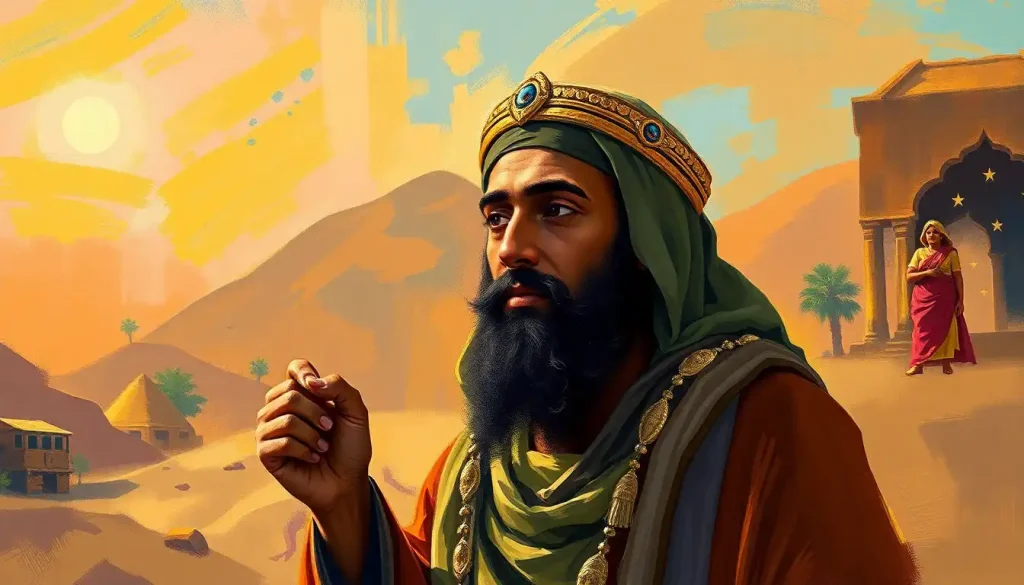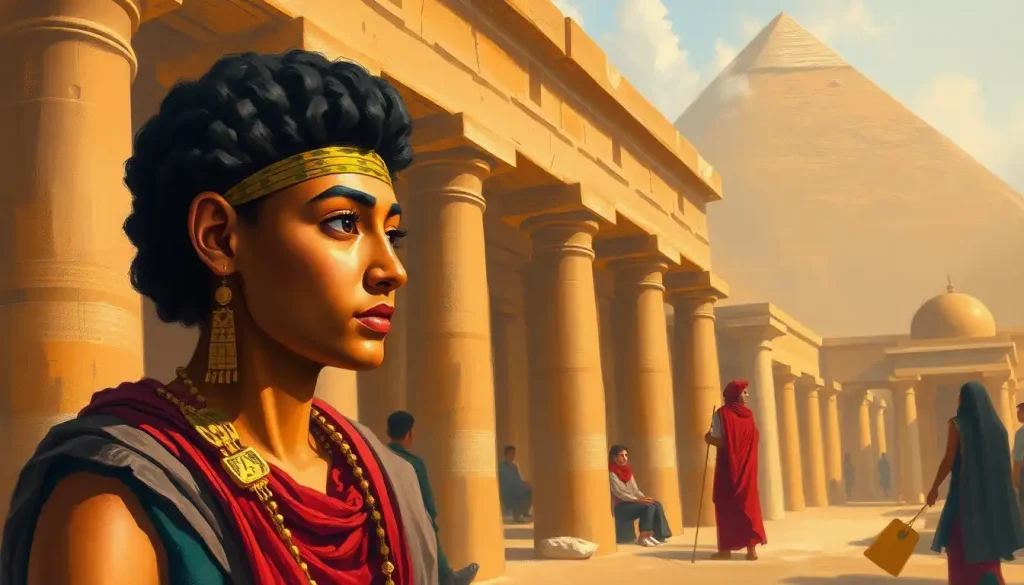Ancient Greece’s obsession with wealth and abundance spawned not just philosophical debates and social hierarchies, but an entire pantheon of divine beings dedicated to the pursuit and distribution of riches. The ancient Greeks, with their keen eye for the complexities of human nature, recognized that wealth was not merely a matter of material possessions, but a force that could shape destinies, influence societies, and even sway the gods themselves.
In the bustling agoras and sun-drenched olive groves of ancient Greece, wealth was more than just a means to an end. It was a symbol of divine favor, a mark of status, and a subject of intense fascination. The Greeks, ever mindful of the capricious nature of fortune, sought to understand and appease the divine forces that governed the ebb and flow of prosperity.
At the heart of this pantheon of abundance stood Plutus, the Greek god of wealth. Unlike the more familiar Olympian deities, Plutus occupied a unique position in the Greek mythological landscape. He was not one of the twelve major gods who resided atop Mount Olympus, but rather a figure who moved between the realms of gods and mortals, embodying the very essence of wealth and its distribution.
Plutus: The Enigmatic God of Riches
Plutus, whose name itself is derived from the Greek word for wealth, “ploutos,” was a figure shrouded in mystery and contradiction. Born to Demeter, the goddess of agriculture and abundance, and Iasion, a mortal, Plutus straddled the line between the divine and the human worlds. This unique heritage perhaps explains his complex relationship with wealth and its distribution among mortals.
In Greek mythology, Plutus was often depicted as a young boy or a blind man. The symbolism of his blindness is particularly intriguing. It was said that Zeus, the king of the gods, blinded Plutus to prevent him from favoring only the righteous and virtuous with wealth. This act of divine intervention ensured that wealth would be distributed indiscriminately, reflecting the often arbitrary nature of fortune in the mortal world.
Despite his blindness, or perhaps because of it, Plutus became a powerful symbol of abundance and prosperity in ancient Greek culture. He was often portrayed holding a cornucopia, the horn of plenty, overflowing with fruits, grains, and coins. This imagery vividly captured the Greek conception of wealth as not just monetary riches, but as a broader state of abundance and well-being.
The Divine Economics of Ancient Greece
While Plutus may have been the primary deity associated with wealth, he was far from alone in this domain. The Greek pantheon boasted a diverse cast of characters who played various roles in the complex divine economy of ancient Greece.
Hades, the ruler of the underworld, was also closely associated with wealth. As Hades: God of Wealth or Underworld? Unraveling the Mythological Mystery explores, this connection stemmed from the belief that precious metals and gemstones were found deep within the earth, Hades’ domain. The Greeks even used the epithet “Plouton” (meaning “the Rich One”) to refer to Hades, further emphasizing his association with underground riches.
Demeter, Plutus’ mother, also played a crucial role in the Greek conception of wealth. As the goddess of agriculture, she was responsible for the fertility of the earth and the abundance of crops. In a society where agricultural prosperity was synonymous with wealth, Demeter’s importance cannot be overstated. Her influence extended beyond mere sustenance, encompassing the broader concept of abundance and prosperity.
Hermes, the swift-footed messenger of the gods, was another deity closely linked to wealth and prosperity. As the god of commerce, trade, and thieves, Hermes embodied the more dynamic aspects of wealth creation and circulation. His ability to move freely between the realms of gods, mortals, and even the underworld made him a fitting patron for merchants and traders, who sought his favor in their business dealings.
Myths and Legends: The Divine Drama of Wealth
The myths surrounding Plutus and other wealth-related deities offer fascinating insights into the Greek understanding of prosperity and its place in human affairs. One of the most famous stories involving Plutus tells of his encounter with Penia, the personification of poverty. In this tale, Plutus and Penia have a child together named Poros, who represents resourcefulness or expediency.
This myth beautifully encapsulates the Greek view of wealth as a force that exists in tension with poverty, with resourcefulness emerging as the offspring of their union. It suggests that true prosperity comes not just from material abundance, but from the ability to navigate between extremes and make the most of one’s circumstances.
Another intriguing myth involves Plutus’ interactions with the goddess Tyche (Fortune). In some versions of the story, Tyche is depicted as guiding the blind Plutus, determining where and to whom he distributes his wealth. This narrative reflects the Greek understanding of the often capricious nature of fortune and its role in the distribution of wealth.
These myths and others like them had a profound influence on Greek society. They provided a framework for understanding the seemingly arbitrary nature of wealth distribution and offered hope that, through proper worship and virtuous living, one might curry favor with the gods of abundance.
Worship and Rituals: Courting Divine Favor
The worship of Plutus and other wealth-related deities was an integral part of ancient Greek religious practice. While Plutus did not have as many dedicated temples as some of the major Olympian gods, he was often honored in shrines and sanctuaries associated with other deities, particularly those of his mother Demeter.
One of the most famous sites associated with Plutus was the Sanctuary of Eleusis, where the Eleusinian Mysteries were performed. These secret religious rites, dedicated primarily to Demeter and Persephone, also included worship of Plutus, reflecting the close association between agricultural abundance and wealth in Greek thought.
Offerings to Plutus and other wealth deities often included agricultural products, reflecting the agricultural basis of much of Greek wealth. Worshippers might offer sheaves of wheat, fruits, or libations of wine. In some cases, small representations of cornucopias or coins might be dedicated as votive offerings.
Festivals celebrating abundance and prosperity were common in ancient Greece. The Thesmophoria, a women-only festival honoring Demeter, included rituals aimed at ensuring agricultural fertility and, by extension, prosperity. The Plutonia, festivals specifically dedicated to Plutus, were celebrated in some Greek cities, though details of these celebrations are scarce in the historical record.
The Legacy of Divine Wealth in Modern Times
The influence of Plutus and other Greek wealth deities extends far beyond the confines of ancient history. Their stories and symbolism have continued to captivate imaginations and influence culture well into modern times.
In literature and popular culture, Plutus and his Roman counterpart Pluto: God of Wealth and Ruler of the Underworld in Ancient Mythology have made numerous appearances. From Dante’s “Divine Comedy” to modern fantasy novels, these figures continue to embody concepts of wealth, abundance, and the underworld.
Modern interpretations of wealth deities have also evolved, reflecting changing attitudes towards prosperity and its role in society. While the ancient Greeks saw wealth as a divine gift (albeit sometimes arbitrarily bestowed), modern perspectives often grapple with questions of economic inequality, social responsibility, and the ethics of wealth accumulation.
Interestingly, the concept of divine wealth is not unique to Greek mythology. Many cultures around the world have their own deities associated with prosperity and abundance. For instance, the African Goddess of Wealth: Exploring Aje and Other Divine Figures of Prosperity offers a fascinating comparison to the Greek pantheon. Similarly, Lakshmi: Goddess of Wealth, Prosperity, and Abundance in Hindu Mythology provides another perspective on divine wealth from the rich tapestry of Hindu tradition.
Lessons from the Divine Economy
The ancient Greek conception of wealth, as embodied by Plutus and his divine colleagues, offers valuable lessons for our modern understanding of prosperity and its role in society.
First, the Greeks recognized the dual nature of wealth – its potential for both good and ill. The blindness of Plutus serves as a potent reminder that wealth does not always flow to those who may seem most deserving. This concept challenges us to consider the arbitrary nature of fortune and the responsibilities that come with prosperity.
Secondly, the Greek pantheon’s approach to wealth was holistic. It wasn’t just about money or material possessions, but encompassed ideas of abundance, fertility, and well-being. This broader conception of wealth encourages us to look beyond mere financial metrics when considering what it means to be truly prosperous.
Lastly, the myths surrounding these deities highlight the interconnectedness of different aspects of prosperity. The relationship between Plutus and deities like Demeter (agriculture), Hermes (commerce), and Hades (underground resources) reminds us that wealth is not created in isolation, but is part of a complex economic and social ecosystem.
The Enduring Allure of Divine Wealth
As we reflect on the rich tapestry of myths and legends surrounding Plutus and other Greek wealth deities, it’s clear that their influence extends far beyond the confines of ancient history. These divine figures continue to captivate our imaginations, offering timeless insights into the human relationship with wealth and abundance.
From the blind god Plutus to the underworld riches of Hades, from Demeter’s agricultural bounty to Hermes’ mercantile savvy, the Greek pantheon presents a nuanced and multifaceted view of wealth. This divine economy serves as a mirror, reflecting our own complex attitudes towards prosperity, fortune, and the distribution of resources.
In our modern world, where discussions of wealth inequality, economic justice, and the ethics of prosperity are more relevant than ever, the lessons of ancient Greek mythology offer valuable perspectives. They remind us that wealth, in its broadest sense, is not merely a matter of accumulation, but a force that shapes societies, influences human behavior, and carries with it both opportunities and responsibilities.
As we navigate our own relationship with wealth and abundance, we would do well to remember the wisdom embedded in these ancient tales. Whether we see ourselves as blessed by Plutus, guided by Tyche, or somewhere in between, the myths of divine wealth encourage us to approach prosperity with mindfulness, gratitude, and a keen awareness of its power to shape our world.
In the end, perhaps the most enduring legacy of Plutus and his divine colleagues is the reminder that true wealth extends far beyond material riches. It encompasses the abundance of nature, the prosperity of communities, and the richness of human experience. As we pursue our own paths to prosperity, may we carry with us the wisdom of the ancients, seeking a wealth that enriches not just our coffers, but our lives and our world.
References:
1. Burkert, W. (1985). Greek Religion. Harvard University Press.
2. Graves, R. (1955). The Greek Myths. Penguin Books.
3. Hard, R. (2004). The Routledge Handbook of Greek Mythology. Routledge.
4. Larson, J. (2007). Ancient Greek Cults: A Guide. Routledge.
5. Morford, M. P. O., Lenardon, R. J., & Sham, M. (2011). Classical Mythology. Oxford University Press.
6. Parker, R. (2011). On Greek Religion. Cornell University Press.
7. Price, S., & Kearns, E. (2003). The Oxford Dictionary of Classical Myth and Religion. Oxford University Press.
8. Smith, W. (1870). Dictionary of Greek and Roman Biography and Mythology. Little, Brown and Company.
URL: https://www.perseus.tufts.edu/hopper/text?doc=Perseus%3Atext%3A1999.04.0104
9. Versnel, H. S. (2011). Coping With the Gods: Wayward Readings in Greek Theology. Brill.
10. Woodard, R. D. (2007). The Cambridge Companion to Greek Mythology. Cambridge University Press.












Would you like to add any comments? (optional)